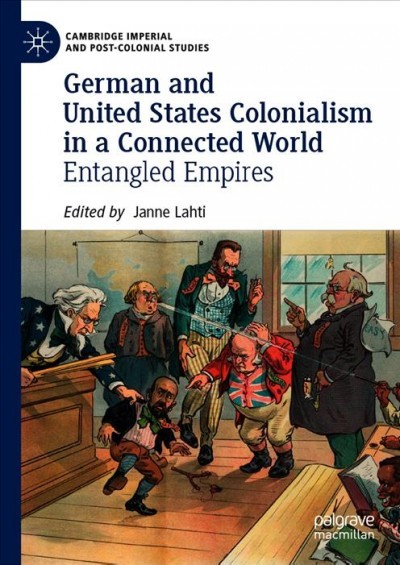#history books
People talk about all the unread fiction books piling up on their shelves but what about unread history books ? I have so many of those, please help
Forgotten history books come in two forms:
- books you bought for your studies but almost never used and now remind you of past stressing exams
- books people gifted you because they know you like history and that you totally mean to read one day but will probably stay on your shelf forever
People talk about all the unread fiction books piling up on their shelves but what about unread history books ? I have so many of those, please help
“This important collection offers a wealth of thought-provoking essays that open up a long overdue discussion about the myriad ways that U.S. and German colonialism interacted with one another across the long nineteenth century. After reading German and United States Colonialism in a Connected World, it will be impossible to think about U.S. or German history—or, indeed, global history—the same way ever again.”
Post link
Just an FYI - new popular fiction about the Erebus coming next week. It’s likely to be interesting becasue, well, Michael Palin. Yes I like Monty Python, and he is an amateur historian (I’ve heard this is the reason behind Monty Python and the Holy Grail). Terror had a pretty interesting career as well. It was launched to bomb Ft. McHenry in Maryland during the War of 1812, was nearly crushed in the arctic under the command of George Back, captained by Francis Crozier in the Antarctic where it survived a collision with Erebus and finally settled in near pristine conditions in the arctic. At risk of getting annoyingly philosophical about it, I like finding the history of the vessels. They’re just inanimate objects but you can’t help but think of them silently serving their commanders until they reach their final resting place, either crushed and lost at the bottom of the ocean like Endurance or resting like a grand old lady like Fram. I like to think of Erebus and Terror waiting patiently to be listened to.
Anyway, here’s a plate from Terror’s original occupation as a bomb vessel. The ‘GR’ indicates its use under King George III.

Florian Ebeling. The Secret History of Hermes Trismegistus: Hermeticism from Ancient to Modern Times. Translated by Jan Assmann. Cornell University Press, 2007. Paperback edition. 158 pages.
Shop link in bio.
Lynn Wood Mollenauer. Strange Revelations: Magic, Poison, and Sacrilege in Louis XIV’s France, Magic in History. The Pennsylvania State University Press, 2006. Paperback edition. 213 pages.
Shop link in bio.

“In seven compelling essays, the author narrates Japan’s modern history through its gendered and sexualized figures: imperial soldiers and salarymen, good wives and wise mothers, New Women and Modern Girls, comfort women and prostitutes, sexologists and queers, artists and video gamers. Frühstück combines great erudition with effervescent storytelling.”

“This book is deeply researched, nuanced in its arguments, and original in its conception. It is destined to become an essential source on both Civil War finance and the development of American financial markets more broadly.”

“Using sources from an impressive array of municipal, royal, and ecclesiastical archives, Franklin-Lyons’s ambitious and timely study offers a convincing accounting of the roles that human agency played in generating or worsening food shortages within the later medieval western Mediterranean. This highly original treatment fills a notable void in medieval Mediterranean historiography, adds texture and nuance to existing work on premodern food crises, and will serve as a valuable model to scholars and nonspecialist readers interested in inequality and the essential roles played by governmental institutions.“

“Joe William Trotter Jr.’s African American Workers and the Appalachian Coal Industry is more than a topical collection of essays by a pioneering scholar summarizing the history and historiography of Black coal miners. At a time when race, class, labor, and structural violence are coming back into sharp thematic focus due to the disproportionate effects of a major global pandemic on many communities of color, Trotter’s work is also a prescient—and deeply personal—exploration of the formation and growth of Black working-class communities, institutions, social and cultural networks, and political movements for reform and liberatory change over time.”

“This beautifully crafted narrative weaves together the story of the relationship of Magnus Hirschfeld and Li Shui Tong with a brilliant analysis of Hirschfeld’s complex but ultimately racist thinking about homosexuality, race, and empire. It’s hard to do justice to the power of this book. Let me just say that once you open it, you’ll have trouble tearing yourself away, and not only because you’ll want to know what happened to Li’s manuscript.”

“Jochen Arndt’s path-breaking study, Divided by the Word, examines how the South African languages, isiXhosa and isiZulu, have come into being. Meticulously researched and drawing on a rich array of rarely used primary sources, Arndt shows how the boundaries of these languages and ethnic identities were constantly shaped and reshaped over the centuries by a host of actors: European missionaries and mission rivalries, African interpreters and translators, black and white intellectuals, educators, and apartheid ideologues. Clearly written, this book is a must-read for historians and analysts of contemporary South African developments.”

“David Silkenat has written an astoundingly original history of southern slavery. To the crimes against humanity committed by enslavers, one can add environmental destruction. It is the enslaved, whose interactions with the flora, fauna, and landscape allow them to create alternative geographies of freedom, who emerge as stewards of the south. Scars on the Land reveals perceptively the long afterlives of slavery all around us.”

“Samuel Clowes Huneke brilliantly excavates the half-forgotten story of gay activism on both sides of the Iron Curtain, with startling results for those who assume only capitalist democracy can cradle our futures.”

“From hot-air balloons to perpetual-motion machines, Susan Branson takes us on a delightful tour of the technological marvels of the nineteenth century. More importantly, Scientific Americans offers us a smart analysis of the ways popular amazement translated into the shaping of American national identity. It is a wise and lively book.”

“Salinas is a sensitive yet critical history of how a unique urban-rural place in California navigated its growth as a farming empire and increasingly multiracial community. Long-established and impassioned community historian Carol Lynn McKibben has created a chronicle of Steinbeck Country that inspires fascination, respect, debate, and reflection.”

“Tracking the evolution of a century’s worth of targeted marketing, this history documents the sinister engineering of a Black consumer preference for menthol cigarettes. Wailoo details how Big Tobacco placed billboards in inner-city neighborhoods, strategically funded Black enterprises, and marshalled a vast network of influencers—from Ebony to the N.A.A.C.P.—to yoke ideas of Black authenticity to smoking menthols.”

“Original and meticulously researched, Lobban’s book places the legal politics of detention at the heart of histories of rebellion, protectorates, and martial law. A valuable addition to the legal history of Africa and the British Empire.”

“Freedoms Gained and Lost is a splendid and timely collection of thought-provoking essays on a wide range of issues surrounding Reconstruction in America. These well-written and thoroughly researched essays exemplify the latest advances in the scholarship of Reconstruction and together make a profound contribution to the field.”

“This edited collection of primary sources for the first time gives an insight into the experiences of these ordinary people under German occupation, their everyday life and how this quickly became dominated by shortages (especially of food but also of other necessities such as medicine), the search for supplies and different strategies to fight scarcity. In addressing examples from all European countries under German occupation the collected sources give the first pan-European perspective on the history of shortage, malnutrition and hunger resulting from the war, occupation, and aggressive German exploitation policies.”

“Pathbreaking and important. In this remarkable book, da Costa Meyer provides a refreshing, original view of the many avenues through which modern Paris came to being, weaving compelling visual descriptions of the city in its material reality and in art and literature.”

“Weaving the history of technology and culture together with the history of cross-cultural/religious encounters, Joseph W. Ho tells a great story. Developing Mission sheds new light on the literature of the history of US missionaries in China.”

“Matthew Ehrlich takes what might have been local events and uses serious research to illuminate and elevate them to national and historical significance. His thoughtful weaving of threads such as academic freedom, university governance, student life, and sexual mores becomes a lively story and analysis of higher education that builds suspense, then provides answers. One of the best accounts of campus life and problems in the early 1960s I have read.”













